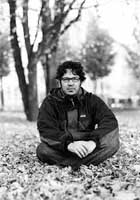Equestrian Monuments (A Litany) Poem by Luis Chaves
Equestrian Monuments (A Litany)
TRANSLATED BY JULIA GUEZ AND SAMANTHA ZIGHELBOIM
Out-of-focus photographs
in front of equestrian monuments.
The fog of the drug,
low-impact anecdotes
and scenes from badly dubbed films.
With this we arrive at our 40s
and we shouldn't be ungrateful.
It could be worse.
•
The year ending
with the month of parakeets
who didn't let anyone sleep
with their demented squawking.
The day we lowered our arms
believing we were raising them.
•
An arm, a fragment of an arm
congealed on the left margin:
the photograph in which we're posing like tourists
in the ugliest city in the world.
An extremity outside the frame
pointing toward a place
without historical value.
That photograph,
the mechanics of a smile set in motion
by a signal from the stranger who took it.
•
To keep from dwelling on the imminent
let's speculate about the fate
of a friend from elementary school
who always covered his notebooks in pink.
Or let's be practical
and calculate our taxes.
•
May God keep you, she thinks.
Blessings, she says.
•
Every four months,
with technical precision,
Mom asks if I'm gay.
•
Son (leaving the table): See you tomorrow.
Mother (under her breath): God willing.
•
Vacation of '91,
before nightfall,
downloading the catalogue
of bootlegs.
The Exorcist on repeat for weeks
to commit the dialogue to memory:
15 years later, nothing remains.
A vacation's
useless exercise.
The crisis of our 40s
at 22.
•
The weeds grow
when we're not watching them.
Years accumulate
while we worry about the weeds.
Learning this took
longer than we would have liked.
•
"See you tomorrow."
"If that's God's will," she corrects me.
•
From the sun, surpassed again
by rotation and refraction,
a few minutes of orange light are left
flattering the silhouettes
of the park's elderly, unmoving.
This is how it is or this is how I see it through
the extenuating filter
of 10mg of Klonopin.
•
The fog of the drug,
low-impact anecdotes
and scenes from badly dubbed films.
At that hour of the morning
when the transvestites
begin to grow a beard.
•
Vices explain the glassy stare
of someone who saw someone else
ironing the old bills first
on the cleared section of a table
cluttered with stolen appliances
to later, meticulously,
restore each one with Scotch tape.
•
Jorge (the gardener) is weeding.
"See you tomorrow."
"God be with you."
•
Parents' house
a gluttonous Sunday
(pants unbuttoned),
every idea is a capital sin
on the sofa in front of the TV.
They show the movie about someone
with the heart of a baboon
or that's what he'd been tricked into believing since he was a child:
the weak muscle
substituted by a fantasy.
•
Succumbing to the interruption,
he writes this:
"Above the bar where joy had been
they built a cathedral
out of everything that doesn't belong to me."
•
Succumbing to the interruption,
he recites this:
"Kyrie, rex genitor ingenite,
vera essentia, eleyson."
•
Statistic:
"I have photographs that used to be ours."
A weak heart. No fantasy.
•
Years and years,
hours and hours
dedicated to exercising the brain
which responds solely to the superficial.
An autonomous organ
dictates the heart's
— not at all metaphorical — ache.
•
In my head there's a homunculus who skips stones, also a cripple who drags his dead leg through the sand of the Pacific and the trail that he's leaving behind looks like the handwriting of someone who's hurt you, and the waves come and the waves erase it.
•
Conversations you can't participate in.
Piles of overdue books.
Keychains without working flashlights.
The line of ants looks like a crack in the wall.
To write on one's own forearm with the sharp edge of a bitten-off fingernail.
Supermarket: rice, mustard, toothpaste, Scotch tape, Tylenol.
Jorge (the gardener): 224-5678.
Supermarket: salt.
Conversations you can't participate in.
•
Off-center photographs
in front of equestrian monuments.
León Cortés's arm,
the shadow of León Cortés's arm,
cast on our 30-year-old biology.
Apart from the extras behind us, everything
looks like a Photoshopped montage.
•
The children of the Second Republic
reproduced without
thinking, fed those who shave
heads and chests and armpits.
Secretly they know it's Independence Day,
August 2nd.
•
Every four months,
like an auditor,
his mother asks if he is an addict.
•
May God keep you, she thinks.
Bless, she says.
•
Out-of-focus photographs,
photographs of people
who consume anxiolytics
rolled-up in a candy wrapper
while they watch badly dubbed films.
A cinema in the suburbs, one afternoon,
a screening for the unemployed.
•
I have these photographs that used to be ours.
If we superimpose the faces,
Linda Blair appears,
that transvestite appears,
the one we've known since elementary school.
•
In place of the heart,
a stone in the shape
of La Virgen Criolla
who liberated us from the Spanish,
from your mother, from your brothers, from obesity,
from understanding the mystery of the Trinity.
•
On the coast of the Pacific
we'd watch the fire attentively
as if it were an intelligent TV.
The glitter of gel in your hair
was a host of mortal stars, diminutive,
extinguishing themselves.
•
It could be worse.
This is how we arrive at our 40s.
By the grace of God,
the fog will soon disperse,
so that we can take a photograph of the group, of the country,
so that we can begin again where the cripple left off.
•
Off-center photographs
every four months,
damaged bills
in a pants pocket,
the sun as seen from a flat planet,
the parakeets that month
when we lowered our arms
believing we were raising them.
This poem has not been translated into any other language yet.
I would like to translate this poem